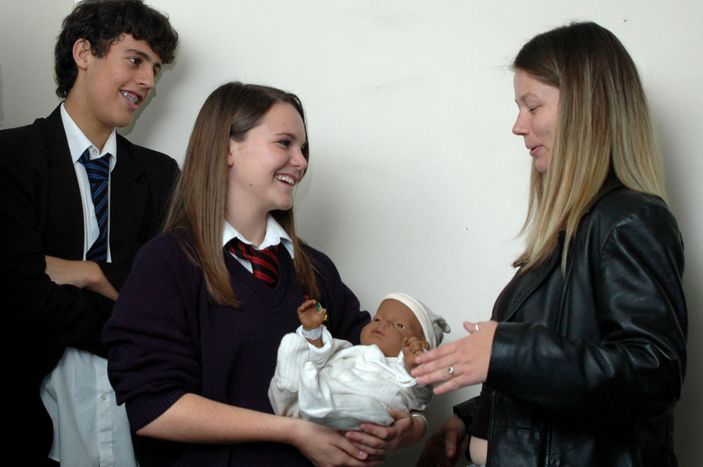
The Power of Peer Education: Back to School
Published on
Words cannot describe the power of peer education and the benefits that come from young parents going back to school to teach youth about issues surrounding pregnancy.
It’s 9 am and it’s the first time I’ve been to school in years. The corridors still have that strange mixture of smells and I find myself transported back to a simpler time of mischief, fun and learning. I’m about to observe my first lesson taken by Straight Talking Peer Education, a charity that employs teenage parents — getting them back into education, employment and training; simultaneously, these parents educate young people on the benefits of waiting until they are older before they choose to have children. I’m incredibly curious as to how a potentially awkward session like this will proceed.
I’m escorted to a classroom by a pupil; the visual aids around the room conjure up a deep feeling of nostalgia as I sit down in a chair that I have outgrown years ago. I’m in a Year Nine classroom full of excitable and gregarious pupils who have no fear in asking me what I’m doing in their classroom. I’m unusually nervous at their relentless questions but the focus soon shifts as Shannon — the peer educator — begins to introduce herself. She eases the pupils in by getting them to give their names and asks them individually how they would feel about falling pregnant during their teenage years. The answers, I’m shocked to say, are quite varying. Many of the pupils insist that they wouldn’t mind but others are less certain.
The meticulously structured programme unfolds as she gives them practical exercises to show them the potential problems of being a young parent. She gets half of the pupils to budget their income with a baby and whilst being on benefits, and then she gets the other half to budget a teenage girl receiving income from a part time job at home. The pupils quickly realise how their liberties and free time are curtailed by having to look after and deal with a child, and I realise that’s what this programme is very good at - bringing the restrictive realities of being a teenage parent home. What I find is remarkable is how Shannon not too long ago was one of these pupils, how different would her life have been had she been exposed to this informal yet powerful type of education? With this in mind I realise that the programme is not a replacement for sex education. It lacks some scientific rigour, and the emotional and physical lessons that should be taught in sex education are not there. Conversely, what’s in these programmes doesn’t really feature in sex education in schools.
I am pleasantly surprised with the insightful comments that the children make and the dynamic in the classroom. Here children are encouraged to have candid and open discussions in a controlled environment about pregnancy and made to understand the ramifications of becoming pregnant too early. The programme takes the conversations that pupils are already having in the playground and encourages them to have these discussions with all the relevant facts, whilst being led by somebody they can relate to. When pupils know the facts about the benefits system, how the body changes during pregnancy and how their lives may be affected afterwards they understand the gravity involved behind making the decision to become a parent at any age is one that requires careful thought, consideration and a lot of planning. This message is really honed by our peer educators. I can see from their engagement that the pupils feel as if they are having a constructive discussion about falling pregnant early. Teenagers often know how not to get pregnant early but this course is very adept at teaching them why not to get pregnant early. It’s a great contrasting message from the one flaunted about by our pop culture, this message isn’t glamorous or airbrushed this message is real.
And here is where a large part of our problem lies in the lives of pupils, students and even adults. Companies relentlessly flaunt sex in order to sell their products, but they do so without any care or balance in their message. Young people are increasingly exposed to sex through pop culture and have seen sexual images at increasingly younger ages but are not receiving the most appropriate and powerful messages to balance out the increasingly salacious world that they find themselves in. More effort needs to be put in to seek to redress this balance and that is what Straight Talking aims to do. Teenagers tend to disregard professional and authoritative voices when it comes to issues regarding sex and pregnancy, you’d be shocked to hear how much discussion can be coaxed out of these bright pupils from someone they can relate to. I asked the headteacher before I left why she booked the programme for her school year after year:
We used to have nurses delivering sessions. They would come in and provide a wealth of information and whilst it was useful for this it never got to the nitty gritty of the issue. Straight Talking is young people who have been through tough times – this reality is inspirational to our pupils. The Peer Educators say it as it is and as a result the young people are more likely to listen to them
I leave the school after quite an entertaining and informative day, a sharp contrast to how I felt as a teeanger about school, and an acute realisation that although being ten years older than the pupils I interacted with today that I am certainly no more ready for parenthood than they are.



